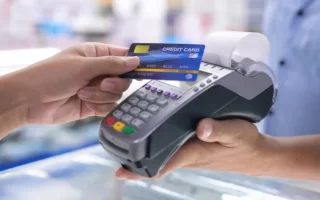You’ve made your final decision on the credit card that best suits your situation. Once you’ve completed and submitted your application, the result flashes on your screen: “Denied.”
While this result may be frustrating, it is simply a business decision made by the issuing bank. Before applying for another credit card, it can be helpful to understand the reason for the rejection.
Here are some possible reasons why your credit card application may have been rejected.
Ready to apply for a new credit card?
Create a NerdWallet account to learn your credit score and get personalized recommendations for suitable credit cards.

1. Your credit score for the credit card you applied for is too low
If your application for new credit is rejected, your credit score may not meet the requirements for the card you applied for.
Your credit score tells potential lenders how risky it is to lend you money. Generally speaking, premium credit cards have the strictest credit score requirements;
- For example, the Chase Sapphire Reserve® is a luxury travel credit card that requires excellent credit (typically a score of 720 or higher) to get approved.
- Alternatively, a card like the Capital One Platinum Secured Credit Card is better suited for people with poor credit (scores below 630) or limited credit history.
If your credit report is richer and you want to earn rewards, check out our picks for the best cash back and travel cards.
2. You have a history of bad credit management
If you have mismanaged your credit in the past, the credit card company may discover this when they accept you for a loan. (This is also called a “hard inquiry” of your credit.) Examples of red flags that may appear during such an inquiry:
- Late payments. Your payment history is the biggest factor affecting your credit score. Payments that are 30 days or more past due will remain on your credit report for seven years, so make every effort to avoid missing payments.
- Bankruptcy. A bankruptcy filing indicates a current or past inability to pay debts. If you recently went bankrupt, your best option is to use a secured credit card to help repair your credit.
- A debt-to-income ratio that is too high. A debt-to-income ratio that is too high can affect your ability to repay your loan in a timely manner. This can be dangerous to lenders. A lower ratio indicates that you may have more cash to pay off your debts, which can increase your chances of approval.
3. Your credit history is not good enough
Poor or non-existent credit standing can create uncertainty for creditors because there is no history of responsible credit management.
If you have no credit history, your chances of getting approved are highest with a credit-building card. Once you prove to the lender that you can use the card responsibly, paying your bills on time (preferably in full each month), you’ll be more likely to get better credit cards as well as bonuses and rewards.
4. You are too young
Consumers can apply for a credit card starting at age 18, but the law prohibits issuing a credit card to applicants under 21 unless they have independent income or a co-signer. This is mandated by the federal government under the Credit Card Act of 2009.
A great way to build credit at a young age is to become an authorized user on a parent or guardian’s credit card. Assuming the primary account holder has responsible credit habits, your own credit will benefit as well, and when you’re ready to apply for a credit card yourself, you’ll have an established credit profile you can rely on.
5. Your income is insufficient
Creditors often view part-time workers, students, or people with unstable incomes as applicants who may not be able to repay their debts. This risk can often lead to loan denials if you don’t apply for the right type of credit card.
If you have a lower income, consider a secured credit card. This will require a cash deposit to “secure” your credit line, but it can help you improve your credit profile and potentially earn rewards. Then, if your income and/or points increase, you’ll be in a better position to upgrade to an unsecured card and get your deposit back.
6. You have too many hard requests or new accounts recently
As mentioned above, lenders conduct a rigorous investigation when you apply for credit cards and other types of loans. These potential creditors often don’t like to see a large number of past inquiries on your credit report within a short period of time, because it can indicate (at least to them) that you are in urgent need of a loan.
Therefore, each approved credit application will show up as a new account (also called a “tradeline”) on your credit report. If you’ve applied for a lot of new loans recently, this can be a red flag to other lenders.
Depending on your immigration status, you may not have or be eligible for a Social Security number. This can create a barrier when it comes to credit card approval, as most applications ask for a Social Security number.
However, some specific creditors use non-traditional underwriting methods that may result in approval without a Social Security number.
Another option, regardless of immigration status, is to apply for an Individual Taxpayer Identification Number (ITIN), which can be used in place of a Social Security Number on credit card applications.
8. You don’t have a banking relationship
Some credit card issuers prefer to build a stronger relationship with their customers before extending them credit. This usually starts with a deposit account, such as a checking or savings account.
Once you establish this relationship, your chances of getting approved for a credit card may increase.
9. Violation of the issuer’s internal regulations
Most credit card issuers have specific internal rules for approving credit card applications. Even if you have excellent credit, violating one of these rules could result in your application being rejected.
For example, Chase has a famous 5/24 rule, which limits you to a maximum of 5 credit cards in a two-year (24-month) period. If you exceed that frequency, your new application will be automatically rejected.
It is understood that other card issuers such as American Express and Citi have similar approval rules. However, these rules are often informal, and it is difficult for ordinary consumers to know whether they have done something wrong.
What should you do if your credit card application is rejected?
If your credit card application was denied, your first step should be to find out why. If the denial applies to something on your credit report, the creditor is legally required to send you an adverse action notice under the Equal Credit Opportunity Act (ECOA) and the Fair Credit Reporting Act (FCRA). The notice will explain the reason for the denial and give you a chance to correct the problem before your next application.
Once you understand the reason for the denial, you can call the card issuer’s review hotline. This call will allow you to discuss your application with someone and possibly even have your credit report manually reviewed by an analyst from the card issuer. This interaction can sometimes turn a denial into an approval.



